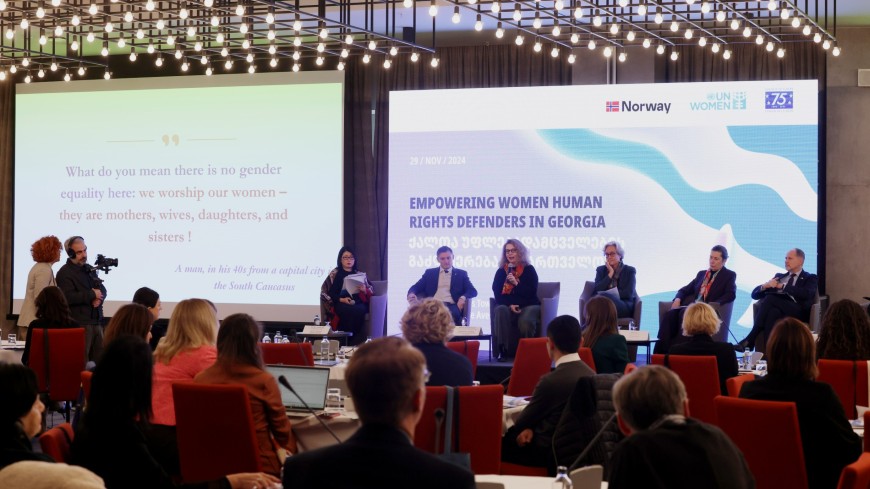On 29 November 2024, Representatives of civil society and international organisations gathered for a high-level meeting under the title “Their Fight, Your Future”, dedictaed to advancing the protection and empowerment of women human rights defenders (WHRDs) in Georgia. Held on the International Day of Women Human Rights Defenders, the event highlighted the vital role WHRDs in promoting gender equality, human rights, and social justice in the country.
Natalia Voutova, Head of the Council of Europe Office in Georgia and Didier Tsegbeuk, UN Resident Coordinator in Georgia delivered opening remarks, joined by Bergliot Hovland, Ambassador of Norway to Georgia; Heidi Grau, Ambassador of Switzerland to Georgia; and Pavel Herczynski, Ambassador of the European Union to Georgia. They acknowledged the significant work of Georgian WHRDs, emphasising the importance of creating a safe and enabling environment for their work.
The Deputy Public Defender of Georgia also addressed the audience, reiterating the state’s responsibility and obligations to protect WHRDs and ensure their contributions are recognised and valued.
WHRDs themselves shared their experiences, discussing the challenges they face in the current context, possible solutions, and the need for solidarity among defenders. They emphasised the importance of mutual support and developing strategies to address risks, including burnout. “I believe we need more human rights defenders - new people in the field to strengthen, support, and share the work with one another. Anti-burnout programmes, such as psychological counselling and peer support, are essential in the current climate.” - noted Esma Gumberidze, a Georgian WHRD.
Discussions focused on the global and local contexts of WHRDs, including insights on the PACE Resolution on Protecting Women Human Rights Defenders in Europe. Giorgio Loddo, Secretary of the PACE Committee on Equality and Non-Discrimination, noted that the resolution reaffirms the crucial role of WHRDs in promoting gender equality and protecting human rights, including the rights of different minority groups, amidst rising challenges such as shrinking civic space, targeted threats, and harassment both online and offline. The resolution calls on Council of Europe member states to provide legal protections, ensure a secure and enabling environment, combat gender-based discrimination, and support WHRDs through funding, training, and inclusive policies, while promoting public recognition of their contributions.
Presenters drew attention to a worrying global trend of intensified efforts to silence the women’s movement and those fighting for gender equality. It was noted that these attacks often originate from various sources, including anti-gender movements, authoritarian regimes, patriarchal religious institutions, community leaders, and alt-right groups. Despite these challenges, meeting participants shared examples of successful strategies or programs that have supported WHRDs in contexts of growing authoritarianism and shrinking civic spaces.
As one of the participants Hurie Abashidze, Co-founder of Solidarity Community, noted: “Being a women's rights defender means confronting numerous obstacles and resistance. Yet, it also involves sharing untold stories with the public, inspiring and empowering other women, and fostering hope that, together, change is possible."
The high-level meeting was organised in partnership with the Gender Theme Group and supported by the Government of Norway, as part of the 16 Days of Activism against Gender-Based Violence campaign. The event was carried out under the UN Women project “Good Governance for Gender Equality in Georgia” and the Council of Europe project “Reinforcing Gender Equality and Implementing GREVIO Recommendations to Combat Violence against Women and Domestic Violence in Georgia,” which is part of the Council of Europe Action Plan for Georgia 2024-2027.





